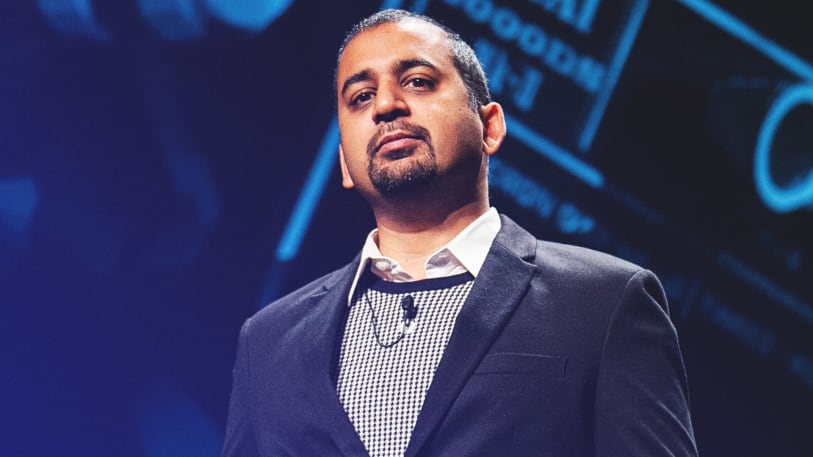Anil Dash Wants To Do More About Tech’s Diversity Problem Than Write Medium Posts
Anil Dash is one of the most outspoken critics and advocates in the technology space. It’s likely you’ve seen his prolific Twitter account or read a piece by him on Medium. He is also the founder of the Twitter analytics platform ThinkUp, a board member for the NY Tech Alliance, and was an adviser to the Obama White House’s Office of Digital Strategy (among numerous other accolades). Last fall he became CEO of the software company Fog Creek, which makes tools for developers. The company has spun out successful products like Stack Overflow and Trello.
Dash is continuing his work as an advocate for more diversity and better equality in the tech space, this time from the inside of a tech company. I recently chatted with him about his new role and what he thinks leaders and founders should do to make the technology space better.
What follows is a transcript of our conversation, which has been edited for space and clarity.
How did you first get involved with Fog Creek?
I was a bit like a fanboy who got to go up on stage with the band. I had always appreciated the cofounders, Joel Spolsky and Michael Pryor. I was a reader of Joel’s blog–Joel On Software–which was really seminal in tech culture around 2000 to 2005. We’d crossed paths because that world of tech bloggers was very small back then. I just loved the ethos and thought what they were doing was great.
Then over the years we started collaborating on things, so I joined the board of Stack Overflow once it became an independent company. I was also an angel investor for Trello. Then last year they showed me one of the brand new products and I thought it was incredible. It wasn’t very long after that when I signed on.
Before being CEO, how would you characterize the work that you did in tech?
I’ve had an unusual career; it’s always been about how tech intersects with other industries. I worked in the music and newspaper businesses, creating tech to help those industries. In the very early days of social media, I helped build some of the first blogging and social media tools that were used to publish Gawker and Huffington Post.
That really changed my perspective on how the industry worked. I started to see how much technology influenced culture in a very direct way–not in an abstract way. From that, I started trying to address the social and civic obligations that I felt the tech industry had. It took a lot of different forms.
I spent several years running a nonprofit project backed by the MacArthur Foundation around public engagement with policymakers using social networks. The idea was, we make these social technologies and social media networks–what can we do that would make the best use of them? One of the technologies that spun out of that became a startup, which I ran for several years. Then, in the process of winding that down, I decided to join Fog Creek.
[Working at Fog Creek] was the culmination of all these ideas because it’s a company that started around a set of values and a very specific, publicly articulated ethos about how we treat our people, community, and customers. The idea was being able to have a role that doesn’t just create great products but also shows people that we can make a company that’s successful and meaningful, while honoring those social and civic obligations.
Was there a catalyst that made you begin to look into these social obligations in tech?
Some of it was from the community I came from–the cohort included creators who would go on to build Twitter, LinkedIn, Tumblr, etc. I was very happy for their success, but also saw that they hadn’t anticipated exactly how much impact they would have.
I started to think pretty early on, ‘Well, we’ve got to get ahead of this and be mindful about how we build our companies or products.’ The entry point was seeing the sort of disgraceful track record tech has on inclusion. Also, I realized that was directly connected to why we have the ethical failings, which often characterize people’s impression of tech as well.
You’ve said that you took the position at Fog Creek, in part because you wanted to begin working from within to help bring change to the tech industry.
The classic criticism is it’s easy to be a critic–to sit outside and point fingers and say, ‘Well, they’re not doing a good enough job.’ How can you be critical credibly if you aren’t actually trying to do the hard work of helping an organization change and grow and evolve?
I’m a big believer that people should show up and roll up their sleeves–especially around what it takes to be a good citizen. I didn’t want to simply be that guy who writes Medium think pieces yelling at people. Not that I won’t also do that. But to be credible, you have to say, ‘Well, this is what we’ve done,’ and really reflect.
The other part is that the industry has developed a very strong immune system to criticism. Conventional critics like academics are dismissed with the notion that “they’re not really in the game.” The conventional activists that other industries would have, sort of what Ralph Nader was to the auto industry, are dismissed out of hand because they’re not founders or entrepreneurs. Media was the last bastion of that kind of criticism. You now see, in the post-Peter Thiel era, they’ll just destroy the media outlets that are critical.
I’ve worked on a fairly academic research project and had been an activist as well as worked in media–I had a column at Wired. I’ve worn those hats. But I am uniquely fortunate because I was also an entrepreneur, a founder. I realized that’s the seat from which I could, one, be most usefully critical, and two, be most uniquely situated to be a meaningful force in changing the culture of tech.
What tangible steps are you making inside Fog Creek to take the industry forward?
Some of it is functional work. We’re going to have our allies skills training session for the team to be able to get up to speed on what we need to do to make sure we’re supporting each other as workers within the company. On one end, it is creating very internal processes: How do we train our team to be a welcoming and inclusive place for people who are joining the company?
And that goes all the way through to this other extreme, which is the products we put up in the world. We’re building tools for people to collaborate around coding and creating technology; How do we make sure we have built an inclusive environment and anticipated things like preventing harassment?
It’s fitting those pieces together, doing it preemptively rather than reactively. [Acting reactively] has been the pattern for so much of this social era of the web; people have made these spaces where a bunch of people act like jerks and then afterwards try to put the cat back in the bag.
Currently you see a lot of companies hiring heads of diversity and roles like “VP of people.” Do you think that’s an effective way to bring about cultural change?
I think it depends on the company. What I do notice is: We look at technical challenges differently. Twitter for many years had trouble scaling. And to solve that problem they didn’t bring in a “VP of scaling.” You can imagine if it were analogous, there would be a “VP of scaling” who has no direct staff, is probably mostly in a marketing function, has no ability to hire or fire people, and has no real budget. Then they would go around to conferences talking about scaling. You’d say, “Well, that’s not going to solve this problem at all.”
To me it’s very revealing that when we talk about inclusion and diversity, rather than it being a thing that a CEO or a founder is held responsible for, it’s instead on some person who has never been part of the organization. They’re brand new, have no budget, have a tiny team, can’t hire or fire or make any real meaningful decisions about the strategy of the company, and are tasked with an impossible charge. And of course, even if they fail at it, they won’t be held accountable. So of course that doesn’t work.
Can we draw any lessons from what’s been going on at Uber over the last few weeks?
There’s probably no end to the different ways that Uber can be a counterexample to what companies should do. One of the biggest things is: Listen to the people who are vulnerable. If you had even the slightest inclination and listened to people talking about Uber’s company culture, it was crystal clear what it was years ago. Three or four years ago, it was plain as day that it would be toxic to anybody who was not a friend of Travis [Kalanick].
Imagine if somewhere during the computer science program at Stanford they’d had an ethics curriculum. This might have dissuaded some of their grads who came out of that CS program from going to work at Uber. It would maybe save them a lot of misery. But we don’t have any of that. We don’t have a robust ethics curriculum as part of computer science. We don’t have the ability to analyze the impact that a product has on society and culture, and on the team that makes it.
What do you think is most important to focus on to help tech?
I think the day to day is what matters. It’s also this idea that Fog Creek has made steps in the past that made it easier for more people to engage with creating software, creating tech.
I think creation so important. The more people can participate, the better the results we have. It’s more likely that the technology we use is going to include all of us and not just some of us.
Fast Company , Read Full Story
(44)














